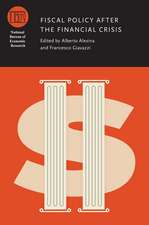Public Finance: A Normative Theory
Autor Richard W. Treschen Limba Engleză Hardback – 3 dec 2014
The welfare aspects of public economics receive extensively renewed examination in this third edition. With four new chapters and other significant revisions, it presents detailed and comprehensive coverage of theoretical literature, empirical work, environmental issues, social insurance, behavioral economics, and international tax issues. With increased emphasis on the European Union, it is rigid enough for use by PhDs while being accessible to students less well trained in math.
- Moves skillfully from explaining normative theory to applying it in mathematically compact and precise terms
- Adds new chapters on social insurance, medical care, social security pensions, behavioral public economics, and international public finance
- Includes new pedagogical supplements, including end-of-chapter questions and answers
- Emphasizes European examples
| Toate formatele și edițiile | Preț | Express |
|---|---|---|
| Paperback (1) | 455.77 lei 5-7 săpt. | +100.94 lei 4-10 zile |
| ELSEVIER SCIENCE – 25 apr 2022 | 455.77 lei 5-7 săpt. | +100.94 lei 4-10 zile |
| Hardback (1) | 426.32 lei 6-8 săpt. | |
| ELSEVIER SCIENCE – 3 dec 2014 | 426.32 lei 6-8 săpt. |
Preț: 426.32 lei
Preț vechi: 526.32 lei
-19% Nou
81.59€ • 88.59$ • 68.53£
Carte tipărită la comandă
Livrare economică 22 aprilie-06 mai
Specificații
ISBN-10: 012415834X
Pagini: 534
Dimensiuni: 216 x 276 x 28 mm
Greutate: 1.7 kg
Ediția:Revised
Editura: ELSEVIER SCIENCE
Public țintă
Advanced undergraduate and graduate students studying public finance and public economics, and more broadly welfare economics.Cuprins
Part I: Introduction: The Content and Methodology of Public Sector Theory 1. Introduction to Normative Public Sector Theory 2. A General Equilibrium Model for Public Sector Analysis 3. First-Best and Second-Best Analysis and the Political Economy of Public Sector Economics
Part II: The Theory of Public Expenditures and Taxation—First-Best Analysis 4. The Social Welfare Function in Policy Analysis 5. The Problem of Externalities--An Overview 6. Consumption Externalities 7. Production Externalities 8. Global Warming: An Application of Externality Theory 9. The Theory of Decreasing Cost Production 10. The First-Best Theory of Taxation 11. Applying First-Best Principles of Taxation—What to Tax and How
Part III: The Theory of Public Expenditures and Taxation: Second-Best Analysis 12. Introduction to Second-Best Analysis 13. The Second-Best Theory of Taxation in One-Consumer Economies with Linear Production Technology 14. The Second-Best Theory of Taxation with General Production Technologies and Many Consumers 15. Taxation Under Asymmetric Information 16. The Theory and Measurement of Tax Incidence 17. Expenditure Incidence and Economy-Wide Incidence Studies 18. The Second-Best Theory of Public Expenditures: Overview 19. Transfer Payments and Private Information 20. Social Insurance: Medical Care 21. Social Insurance: Social Security 22. Externalities in a Second-Best Environment 23. Decreasing Costs and the Theory of the Second-Best—The Boiteux Problem 24. General Production Rules in a Second-Best Environment 25. Behavioral Public Sector Economics
Part IV: Fiscal Federalism and International Public Finance 26. Optimal Federalism: Sorting the Functions of Government Within the Fiscal Hierarchy 27. Optimal Federalism: The Sorting of People within the Fiscal Hierarchy 28. The Role of Grants-in-Aid in a Federalist System of Governments 29. International Public Finance
Recenzii
"Richard Tresch provides a wonderful graduate textbook that is difficult to top in terms of clarity and accessibility. It combines neat mathematical presentation with lots of intuition." --Alfons Weichenrieder, Goethe University Frankfurt
"The ideal graduate treatment of public economic theory. Tresch introduces a general equilibrium model and uses it to solve the classic problems. He then devotes the majority of the book to theoretically examining problems in the second best context, which is the training that students really need to apply theory to real world policy questions." --Stephen Ross, University of Connecticut
Descriere
Public Finance remains the premier textbook on the normative theory of government policy, with the third edition propelling into the twenty-first century its examination of what government ought to be doing instead of what it is doing.
The welfare aspects of public economics receive extensively renewed examination in this third edition. With four new chapters and other significant revisions, it presents detailed and comprehensive coverage of theoretical literature, empirical work, environmental issues, social insurance, behavioral economics, and international tax issues. With increased emphasis on the European Union, it is rigid enough for use by PhDs while being accessible to students less well trained in math.
- Moves skillfully from explaining normative theory to applying it in mathematically compact and precise terms
- Adds new chapters on social insurance, medical care, social security pensions, behavioral public economics, and international public finance
- Includes new pedagogical supplements, including end-of-chapter questions and answers
- Emphasizes European examples






















